- Home
- Marina Oliver
Convict Queen Page 16
Convict Queen Read online
Page 16
'So they caught 'im after all, did they?'
'Not then, Dad. It was something else he'd done, but he'd never tell me what he was charged with.'
'Is 'e back as well? 'Ow did yer get 'ome?'
'He's still there. I got a ship's captain, an American, to bring me back. I'm not supposed to be here, and if I'm caught I'll be in worse trouble. But I wanted to come home, to see you all.'
'But Moll, yer can't stay 'id wi' us,' Samuel said, looking worried. 'It were bad enough when they took you.'
'I know that, and I'll be gone soon. None of you came to see me,' Molly said, sighing. 'When I was in that prison.'
'Yer don't understand,' John said. 'Johnny Cound and 'is father, they was sayin' we were all involved, that we were goin' ter help sell that flax. We lost a lot o' customers, it were a struggle ter make ends meet. We 'ad no money ter come to Shrewsbury.'
Molly sighed. William's thieving had affected more than her. Her entire family had suffered.
'We canna' 'ide ye,' Samuel repeated. 'If ye was found, we'd all be on the boat ter New South Wales.'
'I know, and I'm sorry, but I had no idea William was thieving that flax. I didn't mean to stay, I just wanted to know how you all were. I'll take the children with me to London. I can get a job there, sewing, and they'll never find me. Oh, you should see how big it is! Much bigger than Shrewsbury.'
'I don't want ter go ter Lunnon!' Mary said. 'I likes it 'ere.'
'They 'as ships there, don't they?' James asked. 'I wanna see a big ship, like the one ye went on.'
'What was it like?' her father asked, and as they ate supper Molly told them something about the voyage and life in the new colony. She suppressed the horrors, tried to make it appear the journey had been a holiday, and life in New South Wales similar to life in Corvedale, with prosperous farms and friendly natives.
Afraid for her brothers if they were caught helping her, Molly determined to leave the next day. She and the children would walk to Shrewsbury where they would not be known, and could join the Mail coach there. Not for them the long trudge to London.
'It'll tek yer two days ter walk to Shrewsbury,' Samuel said. 'I'll borrow cart. There's skins for collecting, so yer can ride in style.'
Mary objected, saying she did not want to leave home, but when Molly promised to find her a post as a housemaid in a big house, and described some of the houses she had seen, Mary shrugged and agreed.
'Do you have a job here?' Molly asked.
Mary shook her head. 'Just odd jobs on farms, when they need us.'
'Gough sent money till 'er was ten,' John explained, 'then 'e said she were old enough to earn 'er own livin'.'
Molly nodded. Mary had not been to school, she could neither read nor write, despite Molly having tried to teach her. And judging by the gown she was wearing, which she said she had made herself, she was no seamstress. Becoming a maid in a big house was the best she could expect.
*
Molly drank in all the familiar sights as Samuel drove the borrowed cart northwards, first skirting Wenlock Edge since the old pony, he said, was incapable of dragging the cart up its steep slopes.
'I'll be known as Mary Jones,' Molly said to the children as they passed Church Stretton and were nearing the town. 'It's a common enough name so I should be safe. You'll have to be Jones as well. I daren't even mention the name Morgan in case it's known. And you must never tell anyone that I was sent out to New South Wales. If you do, I'll be hanged.'
'Aye,' Samuel said. 'And James, Mary, luv, if ye say just one word to tell of yer Ma's bein' in England, ye'd be thrown inter goal yerselves.'
This so terrified the children they would have agreed to anything. To impress on them the seriousness Molly told them some of the details of her time in Shrewsbury goal, the poor food, the filth, the lice and rats.
Mary, shivering, became reconciled, though she said she did not want a job cleaning other people's houses.
'I want ter be a cook,' she insisted.
'Then we'd better find you a job as a kitchen maid. You can learn, and in time become a cook.'
'I can cook now! I did most of the cookin' back at 'ome.'
'That's not the sort of cooking they have in big houses,' Molly pointed out. 'Even Mrs Lewis's family had much different food to what we had in Corvedale.'
'It can't be that different!'
'Mary, talk sense. No one will employ a lass of fourteen as a cook. Have you ever cooked turbot? Or made oyster patties? Or meringues?'
'What's them?'
'You see? Have you ever made ice cream? Or marmalade?'
'No.' Mary was sulky, but finally accepted she would have to start as a kitchen maid or tweeny. Gradually, as she realised she would learn far more than she ever could have at home, she became reconciled, and enjoyed looking out of the coach window and marvelling at the sights she saw.
Molly felt a sense of relief. Mary was already a pretty girl, and recalling Richard Lewis, she had been afraid of what might await her daughter. Working in kitchens, however, would keep her safe from men who thought their maidservants were there for them to take their pleasure whenever they wished. Nevertheless, she would try to find Mary a job in a household of women.
*
By the time they arrived in London Mary was speechless with awe, and James kept asking when they were going to see the big ships. Molly had at first thought she would try and find lodgings in Wapping, but recalling the many sailors and pubs there, and seeing how Mary was beginning to show a promise of beauty, she decided it would be safer elsewhere.
When she had been walking westwards from Wapping, she had passed through the next parish, Whitechapel, which had seemed to her a much more refined place, and one where she might more easily find sewing work. So when they arrived in London, weary from the long journey, she spent almost her last few coins on a hackney to St George's in the East, the only place she could think of. There she recalled some lodging houses near the church of St George's, and to her relief was able to find a room to rent in St George's Terrace.
They fell into bed, and even the chimes from the church clock did not disturb them. The children, resilient, were awake early and pleaded with Molly to be allowed to go out and explore this strange but fascinating new world.
'No, not until you are used to it. You'd get lost. It's not like Ludlow, where you can always get back to the market place. Besides, I have only enough money to buy us some bread and cheese for breakfast. I must find work today or we'll starve.'
This made sense, and James in particular looked anxious. Molly relented enough to take them with her to the nearest stall where she haggled for a loaf of yesterday's bread and a hunk of stale cheese. The stall holder was friendly, and when Molly asked directed her to a house where she said they employed seamstresses making shirts for the sailors who came ashore with money to spend.
Molly determined to ask for work there, and though the work would be tedious it would do until she could find something more congenial. James, who had been making friends with a scrubby lad his own age who was hanging about near the stall, begged to be allowed to buy a broom and sweep the crossings of horse droppings and other rubbish for the well-dressed pedestrians.
'They gives us pennies,' he said. 'I could buy some more cheese an' stuff wi' 'em.'
'Not yet,' Molly said. She dreaded losing him, and could not risk him wandering down towards the river to see the ships that so attracted him. As well as being afraid he would try to stow away on one, there were many other dangers on the waterfront for a young lad. In an attempt to curb his enthusiasm she told him and Mary some of the things she had suppressed back at home, about life on board some ships, but promised to take him to see them on Sunday, when she would have a day off from her new work.
Their landlady, Hannah Grimshaw, was friendly and commented on how pretty Mary was. Molly sent the children to their room and accepted an invitation to take a dish of tea. She confided her worries about Mary, and Mrs Grimshaw nodded.
/> 'Ye needs ter tek care,' she agreed. 'But I might be able ter 'elp. There's a couple of ladies livin' in Islington that wants a kitchen maid. They come from Yorkshire, like I do meself, and I was their 'ousekeeper till I got wed. There's no men in 'ouse, not even a footman, so the lass 'ud be safe.'
They'd all be safe, Molly thought, breathing a sigh of relief. Even James. She had succumbed to his desire to sweep crossings after their visit to the docks in Wapping, where she had been just in time to prevent her son being taken aboard a ship by one of the sailors. Would he ever have come back, she wondered, and gave in to his wish. It would keep him busy and allow him to buy some of the sweet foods he craved.
*
Mary was safely installed in the Islington house, and Molly, who had liked her two employers and the kindly cook, felt a stab of relief. She need no longer fret on her daughter's behalf. She earned just enough to pay Hannah for their room, and buy food for herself and James, then Hannah, for whom she had made a gown, asked her if she would consider doing some finer sewing for friends of hers.
'You could do it as well as the regular job,' she said. 'Bring it back 'ome, do it in evenin's or on Sundays. It won't be much yet, but it's a bit extra.'
It brought in money for a few luxuries, and soon Molly was working for several ladies who wanted dresses made, or fine linens mended. When she began to earn more from this work than her regular job she gave up the latter.
One of her main customers was a Mistress Mears, whose husband owned the Whitechapel Bell Foundry. Molly had been to return some linen one day, and as she left the house she almost collided with a gentleman about to enter it. He stepped back, bowing and apologising, and she considered him, for she thought she knew all the workers at the foundry. He was not as fat as Thomas Mears, and his wig was less flamboyant. He had red cheeks, a country look about him, and as he spoke there was a soft burr in his voice. She wondered whether he came from Kent, where Thomas's father William had first become interested in casting bells. Hannah had told her the story.
'It were almost forty years back, an' they was castin' the big bell for Canterbury Cathedral, Great Dunstan they called it – yer knows this daft way they 'ave of givin' bells names – an' William went ter watch 'em.'
'Here in Whitechapel?' Molly asked.
'No, they was doin' it by the Cathedral, it were too big fer a cart ter carry it there, but they asked William if 'e wanted ter work for 'em, and years later 'e come to own the business. This son, Thomas, took over ten year ago. Young Thomas'll tek over when 'is Pa retires.'
*
Molly soon discovered that the man she had not known was called Thomas Mare, and came not from Kent, but Devon. She had seen him again one day when she was buying food for their supper, and he had doffed his hat and asked her if she lodged nearby.
'I was on my way to look at the wharves,' he added. 'I come from another port, Plymouth, down in the west.'
'Plymouth!' Molly recalled the long weeks while the Neptune waited there or in Portsmouth.
'Aye. Do ye know it?'
'No, I come from the middle counties,' Molly said hastily. She never mentioned Shropshire, having a lively fear it would connect her with her past. If anyone persisted with enquiries she said she came from Herefordshire. After all, Ludlow had been almost in that county.
'Aye, we're in Devon, but the town's almost in Cornwall.' He laughed. 'It's like a foreign country.'
It could hardly be like the foreign countries she'd seen, the Cape and New South Wales. Molly shivered, and Mr Mare frowned.
'Are ye cold? I were hopin' ye'd show me round, as I'm such a stranger. Perhaps come with me to look at the wharves. But not if you're too cold.'
He sounded disappointed. Molly smiled.
'No, I'm warm enough. It were a goose crossing my grave. I'll gladly show you round.'
*
During the next week Molly seemed to stumble across Mr Mare almost every time she went out. James came to know him, too.
'He gives me more coppers than anyone else, an' crosses the road twice or more ev'ry day,' James said. 'An' 'e asks where you are.'
Hannah, who was there listening, laughed. 'Ye needs ter be careful,' she said. 'Per'aps 'e don't like what 'e finds down Wappin' way.'
'What d'yer mean?' James asked.
'Just a saying,' Molly said, and blushed. She had wondered the same herself, but Mr Mare was always respectful. Perhaps he was just lonely, and no one at Thomas Mears' place had time to show him around. 'Now go and scrub your dirt off under the pump, it's supper time.'
When he'd gone Molly turned back to Hannah. 'I wonder what his business is with the Whitechapel Foundry? He's been here several days now.'
'Well, if 'e's never bin ter Lunnon afore, he's 'avin' a bit of a 'oliday.'
'He tells me he's a whitesmith, but sometimes he casts bells too. It must be something about that brings him to London.'
He had, he told her, been to see the Tower and other sights in the City, even going to look at the big houses further west.
'I wonder what folks find ter do in such big places,' he said when he was telling Molly of his last venture, when he had gone as far as Hyde Park and seen dozens of men, even a few women, driving sporting carriages. 'And those houses, they'd hold an army! My own 'ouse isn't half as big,' he added, and sighed.
Molly had never seen them, though she thought they must be similar to the big houses in Ludlow's Broad Street. As she never expected to even set foot inside one, she paid little attention to his descriptions. They didn't interest her.
She was carrying a basket of linen to be mended on the following morning when he appeared, and offered to carry the basket for her.
'That's heavy for a lass like you.'
It wasn't at all heavy, but as he seemed to gain pleasure from doing her so small a service, Molly smiled and let him carry it.
As they walked along he told her he was returning to Plymouth.
He hesitated, and his cheeks became redder than ever. He said no more until they reached Molly's lodgings and he put down the basket on the step. He took a deep breath, and Molly wondered if he had found the basket too heavy a burden, which would be surprising.
He turned to her, gulped a few times, stretched out a hand towards her, then swiftly took it back and put it behind him.
'I was wondering,' he said, almost in a whisper, 'if ye'd consider marrying me.'
*
Molly blinked. She had not seen anything especially loverlike in his previous attentions, despite Hannah's sly suggestion. She had thought he was simply being polite, doffing his hat and offering to carry the basket. It had, she'd assumed, been just coincidences when they had met before. He'd appeared lonely, rather lost in these bustling streets.
'You are a widow, I think?' he added when she didn't reply.
'Yes.' Well, Molly thought, she was as good as. Heaven knew what might have happened to William by now, and she had no way, or desire, to find out. Very few convicts returned to England, apart from a few like her with the daring to make the effort and risk punishment if recaptured. And William would not care what became of her. He never had, from the day he stole the hemp and left her to take the blame.
She would have more security than ever, and not have to work to earn a living. Thomas Mare was not old, he was prosperous, pleasant, and he clearly admired her. Against that was Plymouth. Did she want to go back there, to the reminders of her days in the Neptune?
'I've children,' she said, delaying making a decision.
'I know about young James, eleven or twelve, ain't he? He's a nice lad, and trying to help you working at them crossings. Well, I can give him a far better life, he can start to learn the trade. I've a good business,' he added proudly. 'I'm a whitesmith, as I think you know, though I make bells too. But you have other children?'
'A daughter. She's in service, in Islington.'
'How old is she, then?'
'Just sixteen. She wants to be a cook.'
'I can't take a l
ass into my business,' he said, 'and it wouldn't do for a gal belonging to me to be in service.'
'No, I suppose not. What does a whitesmith do? I never really understood.'
Molly barely listened as she tried to make up her mind. He was leaving tomorrow, and once he was back at home he might forget her.
'I work with tinplate and pewter, cold metals, not hot like blacksmiths. I make cups, knives and forks, basins, pails, fancy stuff, lots of things. It's a good business.'
'Yes, it must be.'
'Now, lass, I've sprung it on ye, can't expect an answer right this minute. Go home, and think about it. I'll come round this evening.'
Molly breathed a sigh of relief at the reprieve, and promised she would give him an answer later that day. First she must see Mary, and ask if she minded being left in London on her own. She suspected the girl would not care. She was enjoying her job, said she was learning to make lots of delicacies suitable for two elderly ladies with capricious appetites. She rarely came to see Molly on her days off, preferring, she said, to go out with Alice, the housemaid from a neighbouring house, who had her days off at the same time. But she had to be asked, and told where her mother was going.
Mary shrugged her shoulders and said she didn't care what Molly did. Though she was enjoying her job, and had hopes of being promoted to cook in a few years' time, she had mixed feelings and had always resented being taken away from Shropshire, blaming Molly.
James was happy when he heard that Plymouth was also a port where he could see ships. When Thomas Mare came to see Molly that evening she smiled at him and told him she would be pleased to accept his proposal.
*
CHAPTER 11
Thomas said he had to go back home to see to his business, and prepare his house for Molly's arrival. She would follow on the stage, with James, two weeks later. He went off, whistling cheerfully, to buy the tickets. Molly finished the sewing tasks on hand, but took on no more work. She had some money saved, and bought materials to take with her, luxurious fabrics she had never before worn. As the wife of a wealthy businessman in a provincial town she would be expected to dress well, he'd told her. She managed to sew one dress, from the most expensive fabric she had bought, shimmering blue silk, to wear when she was married. Skirts were getting narrower, and waists higher with deep belts. The previous winter she had bought a new warm cloak, and she trimmed this with scraps of fur saved from a pelisse she had made for one of her clients. She spent the last of her money on a hat and a fur muff, and hoped Thomas would be generous with an allowance.

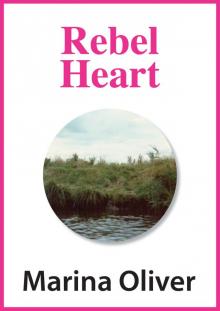 Rebel Heart
Rebel Heart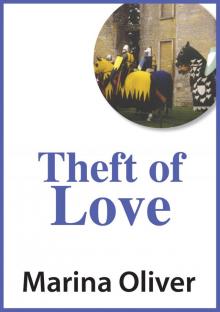 Theft of Love
Theft of Love Courtesan of the Saints
Courtesan of the Saints Fatal Slip
Fatal Slip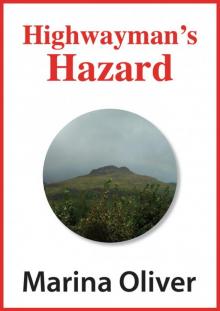 Highwayman's Hazard
Highwayman's Hazard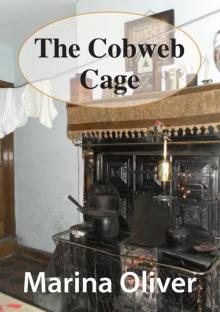 The Cobweb Cage
The Cobweb Cage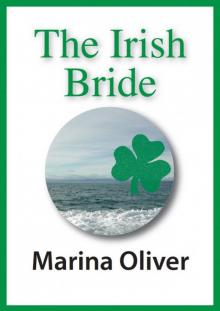 The Irish Bride
The Irish Bride Apple Blossom Bride
Apple Blossom Bride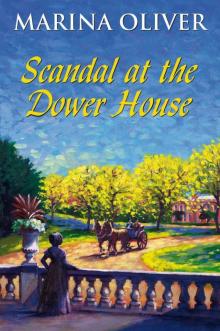 Scandal at the Dower House
Scandal at the Dower House Eugenie and the Earl
Eugenie and the Earl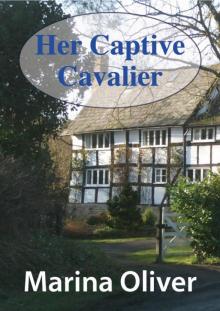 Her Captive Cavalier
Her Captive Cavalier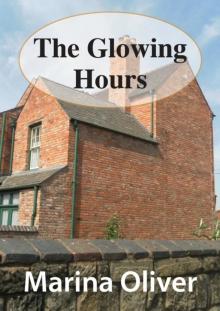 The Glowing Hours
The Glowing Hours Sibylla and the Privateer
Sibylla and the Privateer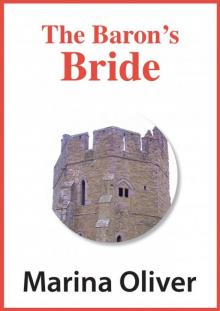 The Baron's Bride
The Baron's Bride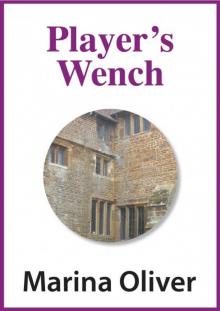 Player's Wench
Player's Wench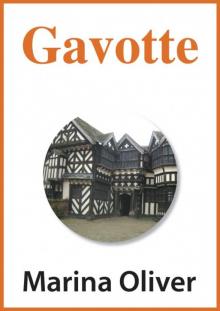 Gavotte
Gavotte The Chaperone Bride
The Chaperone Bride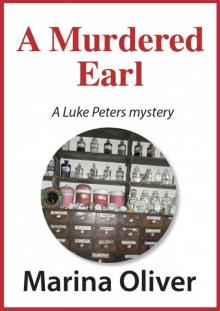 A Murdered Earl
A Murdered Earl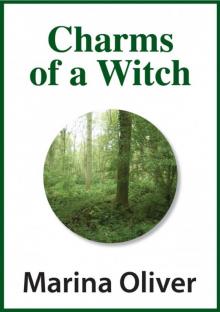 Charms of a Witch
Charms of a Witch Convict Queen
Convict Queen The Accidental Marriage
The Accidental Marriage